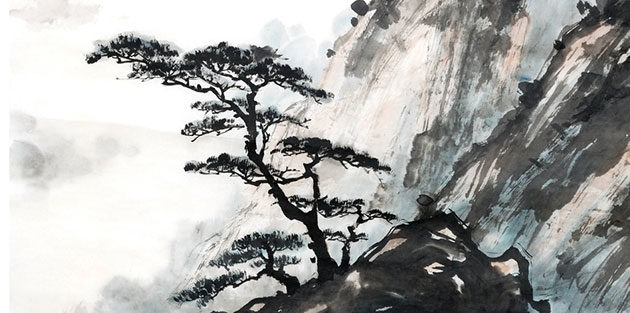Liberty and Small Government in Tao te Ching by Luke Hankins
“When the Master governs,” wrote Lao Tzu, “the people/are hardly aware that he exists.” This passage, like many in the ancient Chinese wisdom poem Tao te Ching (pronounced dow deh jing), expresses the paradoxical view of passivity as the most effective political power:
If you want to be a great leader,you must learn to follow the Tao.Stop trying to control.Let go of fixed plans and concepts,and the world will govern itself.The more prohibitions you have,the less virtuous people will be.The more weapons you have,the less secure people will be.The more subsidies you have,the less self-reliant people will be.Therefore the Master says:I let go of the law,and people become honest.I let go of economics,and people become prosperous.I let go of religion,and people become serene.I let go of all desire for the common good,and the good becomes common as grass.
Tao means “way” or “path,” and Tao te Ching means something like “The Book of the Manifestation of the Way” or “The Book of the Virtue of the Way,” though English-language translators usually keep the Chinese title. The exact dates of Lao Tzu’s life and of the original composition of Tao te Ching are the subject of debate and speculation, but it is certain that the text dates to at least four centuries before the birth of Christ.
Tao te Ching is a central text in Taoism, and Taoist political philosophy tends to be more anarchic than Confucianism, the other major Chinese philosophical tradition. Tao te Ching views laissez-faire, small government, and non-intervention as political ideals in keeping with the Tao.
But what is this Tao, this “Way,” in the first place? Tao te Ching seems to argue against even attempting to define it:
The tao that can be toldis not the eternal Tao.The name that can be namedis not the eternal Name.The unnamable is the eternally real.[. . .]Darkness within darkness.The gateway to all understanding.
Paradoxically, then, those who know the Way know that it is the way of unknowing. Lao Tzu writes, “The more you talk of [the Tao], the less you understand.” The Way, then, is a way of humility, of not presuming to understand.
Similarly, the Way of politics is a way of minimal action, of not presuming to be able to control what rightly lies outside of any person’s or government’s control:
When the government is too intrusive,people lose their spirit.Act for the people’s benefit.Trust them; leave them alone.
Following is a selection of additional passages from Tao te Ching that express the ideals of liberty, small government, and non-intervention both eloquently and beautifully—a voice reaching across the millennia. While we should never make the mistake of reducing a complex and ancient philosophical tradition to a few concepts we find appealing, or simply reading selectively from the tradition, let these excerpts serve as a starting point for those who have yet to delve into the riches of Tao te Ching and Taoist philosophy.
If you don’t trust the people,you make them untrustworthy.The Master doesn’t talk, he acts.When his work is done,the people say, “Amazing:we did it, all by ourselves!”[. . .]Whoever relies on the Tao in governing mendoesn’t try to force issuesor defeat enemies by force of arms.For every force there is a counterforce.Violence, even well intentioned,always rebounds upon oneself.[. . .]Weapons are the tools of fear;a decent man will avoid themexcept in the direst necessityand, if compelled, will use themonly with the utmost restraint.Peace is his highest value.If the peace has been shattered,how can he be content?His enemies are not demons,but human beings like himself.He doesn’t wish them personal harm.Nor does he rejoice in victory.How could he rejoice in victoryand delight in the slaughter of men?He enters a battle gravely,with sorrow and with great compassion,as if he were attending a funeral.[. . .]Governing a large countryis like frying a small fish.You spoil it with too much poking.[. . .]If a nation is centered in the Tao,if it nourishes its own peopleand doesn’t meddle in the affairs of others,it will be a light to all nations in the world.[. . .]When they lose their sense of awe,people turn to religion.When they no longer trust themselves,they begin to depend upon authority.Therefore the Master steps backso that people won’t be confused.He teaches without a teaching,so that people will have nothing to learn.
All quotations from Tao te Ching are reprinted from Stephen Mitchell’s translation, ©1988 by Stephen Mitchell, published by HarperCollins.
ABOUT LUKE HANKINS
Luke Hankins is poetry editor at The Freeman. He is the author of a collection of poems, Weak Devotions, and the editor of Poems of Devotion: An Anthology of Recent Poets (both from Wipf & Stock).
EDITORS NOTE: The featured image is courtesy of FEE and Shutterstock.


